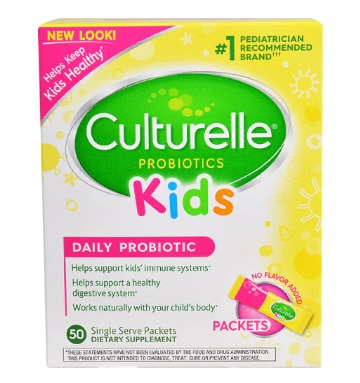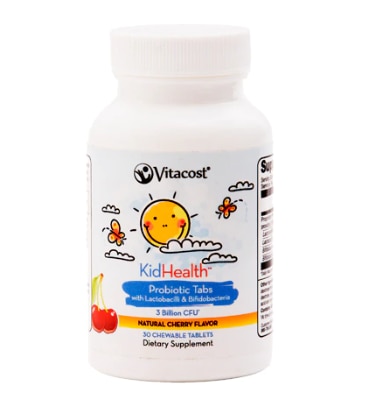Forty to fifty percent of children who visit pediatric gastroenterologists struggle with ongoing or recurring digestive symptoms. These functional GI disorders encompass everything from constipation to celiac disease and can make it tough to enjoy being a kid.
Are probiotics good for kids with these conditions—and other common tummy troubles? Before you spring for supplements or start dishing out sauerkraut, here’s what you need to know to nourish and protect your child’s gut.
Gut health: kids vs. adults
Kids’ microbiomes get seeded at birth and continue to develop throughout childhood and adolescence. Both birth method and timing can affect this foundational event: Babies born via C-section receive different communities of microorganisms than those born naturally, and microbiome diversity is lower in premature babies than those born at full term.
Breastfeeding contributes to further microbiome development by providing prebiotics and antibodies to feed babies’ guts and train their immune systems. Breast-fed babies are also exposed to new microbes from their mothers’ skin.
Although some evidence suggests kids’ microbiomes start to look more like adults’ around age three, newer studies show significant differences may still exist up to age 18. A variety of factors can influence microbiome development during this time, including:
- Dietary fiber intake
- Exposure to pets
- Living in a rural vs. an urban area
- Close contact with other microbial communities (such as siblings and friends)
Supporting a healthy, diverse microbiome starting at birth is important due to the role microbes play in vitamin, mineral and amino acid metabolism. These activities influence development, including proper development of the brain; therefore, disruptions in gut health during the early years of life can have long-lasting effects.
Common problems with kids’ gut health
Kids don’t have as much freedom to control their environments as adults, so it’s not always possible for them to avoid external influences that can have negative effects on microbial richness and balance. Just like in adults, microbial imbalances can make kids more prone to diseases later in life, including heart disease and diabetes. The microbiome may also play a role in the risk and prevalence of allergies, asthma and obesity.
It’s not uncommon for gut problems to pop up during childhood. Constipation, lactose intolerance, IBS, IBD and celiac disease can all disrupt digestive health. Other factors—such as illness, antibiotic use, poor diet and lack of exercise—can contribute to imbalances in the gut by reducing the number of beneficial microbes and creating an environment that lacks microbial diversity.
In some cases, probiotics may be beneficial for controlling or reducing digestive symptoms and restoring richness in the microbiome.†
How probiotics can help your kids
Evidence suggests giving probiotics to kids may help with:
- Infant colic, acid reflux and/or constipation†
- Diarrhea from gastroenteritis†
- Antibiotic-associated diarrhea†
- Other digestive issues†
However, there’s not enough evidence to provide a clear picture of whether probiotics are the best way to address these problems. Due to this, and to a lack of data regarding the safety of probiotics for kids, probiotic foods are generally recommended over supplements.
Kids with specific digestive conditions or who have recently taken several courses of antibiotics may be exceptions. Specific probiotic strains have been studied for their benefits for issues such as IBS and diarrhea, so targeted supplementation with these strains could be appropriate as part of a regimen to address symptoms and re-establish microbial balance.†
Healing and supporting the growing gut
For most kids, focusing on diet and lifestyle over probiotic supplementation is the smartest strategy for developing and maintaining microbiome health.
Here are some easy ways to set your kids up for success with their gut health from an early age:
- Encourage exercise, particularly playing outside, whenever possible
- Cook and serve more plant-based foods
- Remove high-fat, high-sugar ultra-processed foods
- Add probiotic foods like sauerkraut and tempeh to meals
- Try a dairy elimination diet if lactose intolerance is suspected, and note whether symptoms improve
- Promote interaction with animals, either by adopting pets, visiting friends with pets or taking a trip to an animal sanctuary
Taking these steps can improve microbial diversity and richness, which is associated with better health in both kids and adults.
If your child struggles with ongoing digestive symptoms, check with his or her pediatrician before giving probiotic supplements or foods. Not every kid’s system tolerates probiotics well, and immunocompromised kids may be at risk for infection from the microbial strains. Some medications may also interact with probiotic supplements.
Monitor how your child’s symptoms respond to probiotics, and keep an eye out for any side effects. Stop giving supplements or foods if your kids complain about new symptoms or a negative change in digestive discomfort.
When used for specific concerns, probiotics can be good for kids. But remember to go beyond supplements and take a broader approach to nourishing your child’s gut and establishing a rich microbiome that supports overall health as he or she grows.
†These statements have not been approved by the Food and Drug Administration. These products are not intended to diagnose, treat, cure or prevent disease.




